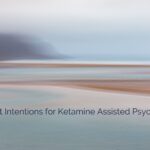By Joey Tadie, PhD, Certified Psychedelic Assisted Therapist
I have been deeply inspired by the experiences I have had working as a Ketamine Assisted Psychotherapy (KAP) provider. After training to become certified as a KAP provider last year, I have had the opportunity to work with clients facing an array of diverse challenges. During that work, I have had the chance to witness clients make significant strides in their therapeutic journey because of the assistance psychedelics bring to their growth process. As a result, I believe more strongly than ever that approaches like KAP have tremendous potential for deep, lasting emotional healing. Here are three reasons why I am incredibly excited about KAP based on the various themes I have observed across clients’ healing processes.
All Roads Lead to Love

Reintegration of our Broken Parts Facilitates Healing
All humans carry wounds or experiences that can create fractures in our identity and psyche. We might feel conflicted about who we are, feel disconnected from ourselves and others, or have mixed beliefs about our value or worth. Some psychological theories even suggest that humans are made up of various “parts” that coalesce into a unified self, but that some of these parts may not always be connected in the healthiest ways because of problems like trauma. Trauma or depression can create or worsen the fractures in the self that lead to psychological suffering and emotional disconnection. KAP appears to work in an integrative fashion to help reconnect fractured parts of the self so that clients report feeling more “whole” or accepting of themselves and others. KAP helps the brain initiate its own ability to heal itself, and this means that fractures that might have occurred in the psyche begin to resolve. This process allows clients to have connection and unity among their various parts, which can manifest in having more satisfaction in their lived experience and healthier relationships with others. KAP seems to operate as an integrating thread that helps knot the self back to wholeness and health.

KAP seems to offer clients the opportunity to resolve immensely complex problems by helping them attune to powerfully simple insights. One of the most liberating insights is that clients emerge from KAP with a deeply felt invitation to see themselves, accept themselves, and love themselves for who they authentically are. Whereas clients may be seeking various types of change through their KAP work, one of the most pivotal and profound changes they are able to make is internalizing the message that they can be exactly who they are with full acceptance. This simple yet challenging concept of being who you are rather than what you believe others want you to be is incredibly liberating. In fact, this acceptance of self does not dissuade growth but rather helps free the client toward being able to initiate, integrate, and preserve growth. It is often our own internal criticism, shame, and rejection of who we are that leads to blocked progress and poor mental health outcomes. KAP allows clients to step outside their self-critical cycles to see the opportunities to love themselves more deeply while also seeing paths toward healing that were previously blocked by doubt, fear, and self-rejection.
In conclusion, KAP is one of the most exciting forms of therapy I have had the opportunity to practice, and although it is not a “magic cure,” it helps facilitate powerful processes that can result in profound, meaningful, and lasting growth. I project that I will spend the rest of my career working toward harnessing the healing potential of psychedelic assisted therapies, and I look forward to bringing this style of therapeutic work to as many clients as I can. Check out our other blogs about KAP and how this revolutionary therapy style is becoming a game-changer in the field of mental health.
Photo Credits:
Photo by Mohamed Nohassi on Unsplash
Photo by Jeff Finley on Unsplash




